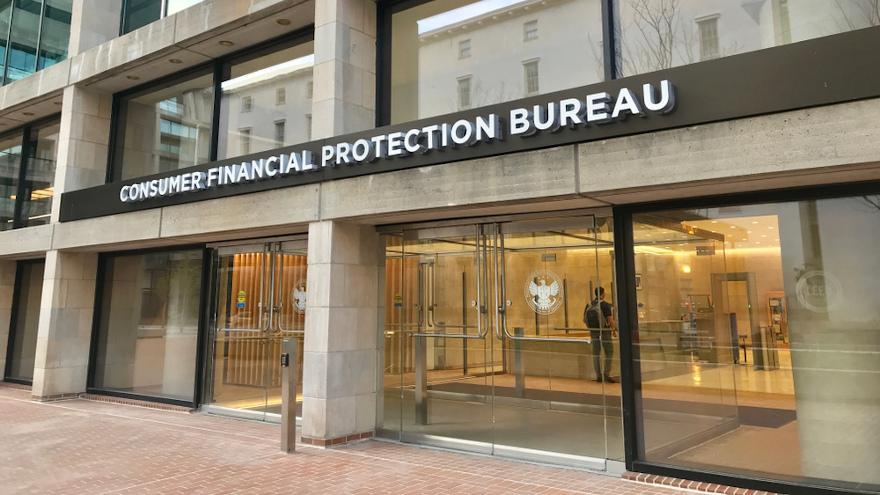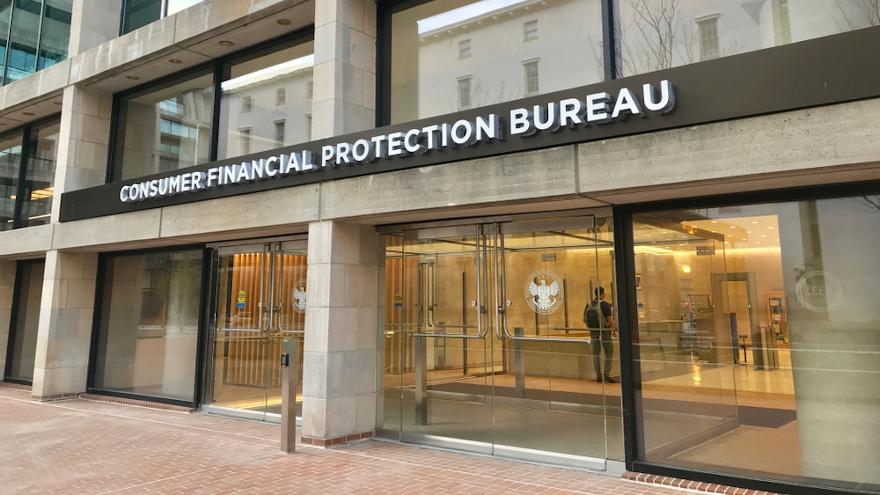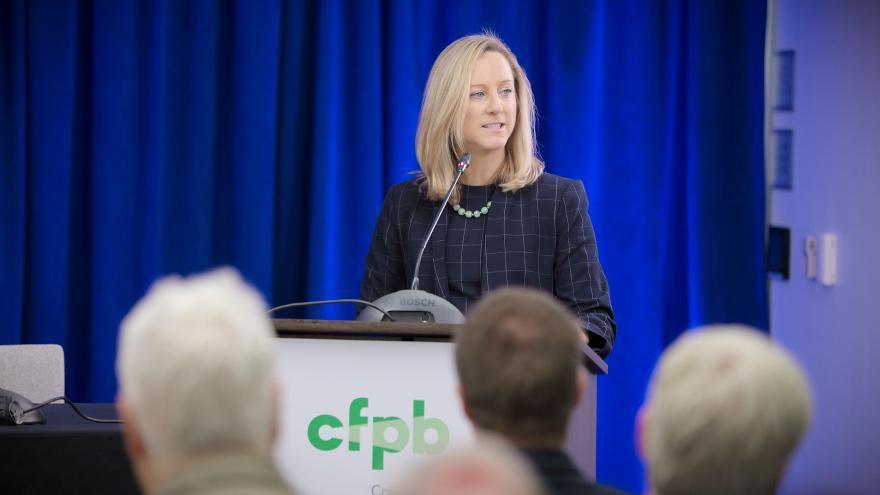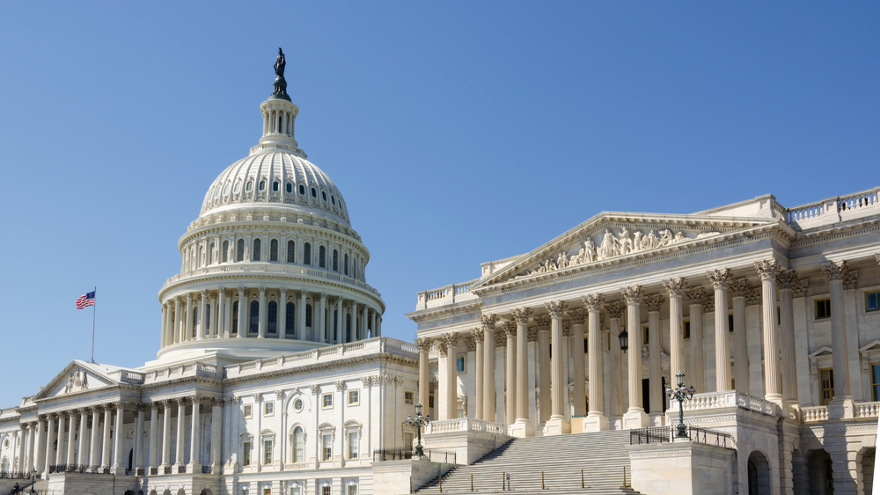Late last month, the three nationwide consumer reporting companies — Equifax, TransUnion and Experian — announced that they would allow people to check their credit reports for free once a week through December.
And coinciding with that decision, the Consumer Financial Protection Bureau (CFPB) is looking for other consumer reporting companies to make a similar move.
The bureau released its annual list of dozens of specialty reporting companies that collect and sell access to people’s data, including individuals’ finances, employment, check writing histories, or rental history records, “often without their knowledge,” according to a CFPB news release.
The list includes operations that the bureau described as “low-income and subprime reporting companies (that) provide consumer information to companies that market and sell products and services specifically to lower-income consumers and credit applicants with impaired credit records.”
The bureau said many of the specialty companies charge people a fee to access this data. The list published can allow people to see which companies provide this information for free, as well as search for those that provide specialized reporting by specific markets, including employment, tenant, insurance, and medical.
Using the list that can be downloaded via this website, CFPB director Rohit Chopra said people can exercise their right to see what information these firms have, dispute inaccuracies and file lawsuits if the firms are violating the Fair Credit Reporting Act.
“Many companies assemble and sell detailed dossiers about us that can determine whether we can get a loan, job, or an apartment,” Chopra said. “Americans have limited legal rights they can use to keep tabs on these surveillance companies and hold them accountable when they violate the law.”
The CFPB has previously highlighted problems that consumers have reported about the three nationwide reporting companies not adequately responding to consumer complaints about errors.
The CFPB also issued an advisory opinion in November affirming that all consumer reporting companies, including tenant and employment screening companies, have an obligation to use reasonable procedures to assure maximum possible accuracy.
The Consumer Financial Protection Bureau (CFPB) launched an initiative on Wednesday in connection with what the federal regulator called “exploitative junk fees” charged by banks and financial companies.
The CFPB said through a news release that it’s making this request so the public can share input that will help shape the agency’s rulemaking and guidance agenda, as well as its enforcement priorities in the coming months and years.
“Many financial institutions obscure the true price of their services by luring customers with enticing offers and then charging excessive junk fees,” CFPB director Rohit Chopra said. “By promoting competition and ridding the market of illegal practices, we hope to save Americans billions.”
As part of its request for comment, the CFPB said it is interested in origination and servicing fees for auto financing as well as for student loans, installment loans, payday loans and other types of loans.
“For example, some servicers charge fees to reschedule payment dates or make online or phone payments,” the CFPB said in the request. “Loan originators often charge application fees and some even charge to receive loan proceeds in an expedited manner.”
Consumer Bankers Association president and chief executive officer Richard Hunt pushed back at some of the initial assertions made by the CFPB, using some colorful analogies and descriptions.
“This is fuzzy math at its best and political theater at its worst, and another attempt by the bureau to fearmonger without any credible data to back it up,” Hunt began in a statement. “The reality is, despite their claims to the contrary, overdraft fees as a percent of total revenue across the industry made up less than 2% in 2019. To best serve America’s families and small businesses, the bureau has a responsibility to communicate with clarity and precision – not with overblown rhetoric to attack one industry.
“America’s leading banks engage in rigorous underwriting practices and are required by law to have clear and conspicuous disclosure of material terms and conditions, aimed at empowering consumers to make informed financial decisions,” Hunt continued. “Fintechs, which represent a sizable and growing segment of the financial marketplace today, often do not abide by these same standards — serving as further impetus for the Bureau to expand its oversight to these firms and mitigate the growing risk they pose to hardworking families.
“The well-regulated, well-supervised banking industry is also among the most competitive in the world,” Hunt went on to say. “Consumers benefit from the ability choose one of the nation’s nearly 5,000 banks to meet their financial needs. The bureau should be focused on seeking feedback from and working in tandem with banks — the very people on the frontlines interacting with customers everyday — to recognize the value these products and services have in the lives of the people we are all working to serve.”
Also chiming in on the situation was the American Financial Services Association (AFSA), which is preparing to host its Vehicle Finance Conference in person again beginning on March 7 in Las Vegas.
Through a blog post, AFSA made its stance clear about this particular CFPB initiative.
“We are all for transparency, so we think it’s important, but we also think it’s important that in discussing such regulatory matters the focus be on the causes, as well as the effects,” AFSA said.
“The cause of the so-called ‘fee economy’ that the CFPB and other regulatory agencies talk about has developed largely because regulatory agencies at the federal and state level over the decades continue to impose new regulations and policies that add new costs for businesses,” the association continued.
“The effect of the regulatory imposition is the fee, so it’s interesting that the CFPB has decided to look at the effect it or other regulatory bodies may well have caused. After all, if not for new regulatory reporting requirements or regulatory policy implementations, many fees would not exist or be necessary,” AFSA continued.
The association touched on one other element when closing its first comment about the regulatory endeavor.
“We would add another point. The CFPB refers to ‘illegal practices’ without being particularly clear on what that term refers to,” AFSA said. “Almost certainly consumers don’t like the fees imposed as the result of regulatory requirements, but that doesn’t make them ‘illegal.’
“ A regulatory agency putting out a blanket statement about illegal activity — but then listing many legal practices — is unhelpful at best and deliberately misleading at worst. Such hotly charged rhetoric obscures the worthy goal of shining a light on the root causes of such fees and the effects they have on consumers and businesses alike,” AFSA went on to say.
Nonetheless, the bureau insisted that financial institutions and other companies across the U.S. economy are increasingly charging inflated and back-end fees to households and families. The regulator contended that this new “fee economy” distorts a free market system by concealing the true price of products from the competitive process.
“For example, hotels and concert venues advertise rates, only to add ‘resort fees’ and ‘service fees’ after the fact. And fees purportedly charged to cover individual expenses, like paperwork processing, can often greatly exceed the actual cost of that service,” the CFPB said in its news release.
The CFPB went on to note that it is interested in hearing about people’s experiences with fees associated with their bank, credit union, prepaid or credit card account, mortgage, loan, or payment transfers, including:
— Fees for things people believed were covered by the baseline price of a product or service
— Unexpected fees for a product or service
— Fees that seemed too high for the purported service
— Fees where it was unclear why they were charged
The CFPB added that it is also interested in hearing from small business owners, non-profit organizations, legal aid attorneys, academics and researchers, state and local government officials, and financial institutions, including small banks and credit unions.
“The CFPB will strive to strengthen competition in consumer finance by using its authorities to reduce these kinds of junk fees,” the bureau said. “To craft rules, issue industry guidance, and focus supervision and enforcement resources to achieve this goal, the CFPB is seeking input from the public.
“Public comments provide valuable insights that allow the CFPB to target the most pressing needs and concerns, including uncovering potential illegal practices or fees,” the regulator went on to say.
American Financial Services Association senior vice president Celia Winslow appeared on this episode of the Auto Remarketing Podcast to discuss what the Consumer Financial Protection Bureau reported when the regulator examined subprime auto financing earlier this year.
Winslow also shared what the association’s dialogue has been like with federal lawmakers and other happenings in Washington, D.C.
To listen to the conversation, click on the link available below, or visit the Auto Remarketing Podcast page.
Download and subscribe to the Auto Remarketing Podcast on iTunes or on Google Play.
Mayer Brown partners Ori Lev, Brian Stief and Kerri Elizabeth Webb compiled a robust analysis of the Consumer Financial Protection Bureau’s authority to enforce a prohibition against abusive acts and practices in connection with the provision of consumer financial products or services.
During the past decade, the Mayer Brown experts pointed out that this new authority raised a host of questions about what conduct was abusive and how the CFPB would use this new tool. Lev, Stief and Webb conducted an analysis recently after Mayer Brown generated a similar one five years ago.
“Some patterns from the early years still hold true — abusiveness is more likely to be alleged in contested litigation than in settled enforcement matters; most abusiveness claims are either paired with, or could be paired with, unfairness or deception claims; and the agency relies on certain kinds of abusiveness claims more than others,” Lev, Stief and Webb wrote in a resulting white paper.
“Yet other patterns changed over the past five years — the CFPB substantially increased its reliance on claims that companies ‘materially interfered’ with consumers’ understanding, and the CFPB relied on abusiveness in a rulemaking for the first time,” they continued. “The big question from 10 years ago — what conduct is abusive that was not already proscribed by the prohibitions on unfair or deceptive conduct — remains largely unanswered.
Now with new CFPB director Rohit Chopra and six other key staffers firmly in place, the Mayer Brown trio added that companies subject to CFPB jurisdiction should carefully follow developments in this space to help ensure they understand the agency’s current thinking about this unique tool.
“From a compliance standpoint, the takeaway is that robust compliance systems to prevent and detect potentially unfair and deceptive acts and practices should be well positioned to prevent allegations of abusiveness,” Lev, Stief and Webb wrote.
“That said, understanding how the CFPB thinks about the various elements of abusiveness claims — such as the prohibitions on ‘materially interfering’ with consumer understanding and ‘taking unreasonable advantage’ of certain circumstances — can help companies avoid not just abusiveness claims but also claims of unfair or deceptive conduct,” they went on to state.
The entire Mayer Brown white paper can be downloaded via this website.
With director Rohit Chopra firmly in place, the Consumer Financial Protection Bureau also has filled several high-profile regulatory positions, including the agency’s assistant director for the office of supervision policy and assistant director for the office of enforcement.
Those two officials help the CFPB supervise banks and credit unions with more than $10 billion in assets, as well as many nonbank firms in markets such as credit reporting, debt collection and more.
Filling the roles are Lorelei Salas as assistant director for supervision policy and Eric Halperin as assistant director for the office of enforcement
“Lorelei Salas and Eric Halperin are both distinguished public servants with deep expertise in consumer protection,” Chopra said in a news release. “Together, they will be effective watchdogs over the financial marketplace, especially when it comes to stopping repeat offenders.”
The CFPB indicated Salas also will serve as the acting assistant director for supervision examinations.
From 2016 until earlier this year, Salas served as commissioner of the New York City Department of Consumer and Worker Protection, overseeing hundreds of inspectors, attorneys, and other professionals to protect city residents. Under her leadership the agency aggressively pursued corporations that employed unlawful, predatory practices to target low-income and immigrant consumers.
Previously, Salas was the legal director at Make the Road New York, supervising immigration, housing, and employment legal services programs designed to increase access to justice for immigrants and refugees. She also led the legal department at Catholic Migration Services, supervising the same areas of legal practice.
In 2009, Salas was nominated by President Barak Obama as the Wage and Hour Administrator at the U.S. Department of Labor. Salas also worked at the New York attorney general’s office in the Litigation and Labor Bureaus and held multiple senior management positions at the New York State Department of Labor.
Salas is also the recipient of Open Society Foundations’ Leadership in Government fellowship and has served as a Fulbright Specialist with expertise in U.S. consumer and worker protection laws.
Prior to her legal career, Salas worked as a private sector auditor investigating companies’ compliance with their own codes of conduct and with federal and state workplace laws.
Meanwhile, the CFPB highlighted Halperin has served in a number of positions in the non-profit and government sectors. Most recently, Halperin was chief executive officer of Civil Rights Corps.
From 2010 to 2014, Halperin served in leadership roles in the Civil Rights Division of the Justice Department, first as special counsel for fair lending and later as acting deputy assistant attorney general overseeing the division’s fair housing, fair lending, and employment enforcement programs.
While in those roles, the bureau mentioned Halperin received the attorney general’s John Marshall Award, the department’s highest award for excellence in legal performance, and the attorney general’s Distinguished Service Award.
Halperin also served as a trial attorney in the civil rights division from 1998 to 2004.
Halperin has also worked as a senior advisor to Open Society Foundations’ U.S. Program and as the director of the Center for Responsible Lending's Litigation Program and its Washington office.
Beyond those two positions, the CFPB also has tapped four other experienced regulators for crucial positions, including:
— Zixta Martinez will serve as deputy director, and in that role will oversee the bureau’s operations division. Martinez joined the bureau in 2010 to help lead the implementation team and has since served as senior advisor for supervision, enforcement and fair lending, associate director for external affairs, and assistant director for the office of community affairs.
Previously, Martinez was senior director of industry and state relations at Freddie Mac, director at the National Fair Housing Alliance, legislative staff attorney at the Mexican American Legal Defense and Education Fund, housing policy analyst for the National Council of La Raza and associate staffer at the Housing and Community Development Subcommittee of the Banking Finance and Urban Affairs Committee in the U.S. House of Representatives.
— Karen Andre will serve as associate director for consumer education & external affairs. Prior to joining the CFPB, Andre served in a number of government, campaign, and private sector roles.
Most recently, Andre served as special assistant to the president for Economic Agency Personnel within the executive office of the president. She worked on President Joe Biden’s 2020 campaign team, including as a senior advisor for national faith outreach. Following Biden’s election, she joined the presidential transition team as the COVID Engagement Team Lead.
Andre also previously served as White House liaison for the Department of Housing and Urban Development.
— Jan Singelmann is returning to the CFPB to serve as chief of staff. Singelmann previously served as senior litigation counsel in the CFPB’s office of enforcement.
Most recently, Singelmann served as counsel for Senate Banking committee chairman Sen. Sherrod Brown, where his work covered consumer finance and data privacy issues.
— Erie Meyer is returning to the CFPB to serve as chief technologist. Meyer served on the implementation team that launched the CFPB, and became a founding team member of the bureau’s office of technology and innovation.
Most recently, Meyer served as senior advisor to Lian Khan for policy planning and chief technologist at the Federal Trade Commission, and as then-commissioner Chopra’s technology advisor.
Before serving at the FTC, Meyer launched the U.S. Digital Service in the White House. Meyer has also served as senior director for Code for America and senior advisor to the White House’s chief technology officer.
Meyer is co-founder of Tech Ladymafia, and she is a recipient of the Harvard Kennedy School’s Joan Shorenstein Fellowship during which she researched the intersection of open data, journalism and civic life.
In August, the Consumer Financial Protection Bureau announced that two final rules issued under the Fair Debt Collection Practices Act (FDCPA) will take effect as planned on Nov. 30.
Coinciding with new research showing how consumers often fail to respond to unidentified callers, the CFPB recently rolled out a series of questions and answers pertaining to compliance with its new debt collection rules.
The bureau’s latest guidance covers topics such as a limited content message, Zortman voicemails and phone-call frequency.
The CFPB’s information can be found via this website.
Meanwhile on Wednesday, First Orion, a provider of digital call experiences for mobile carriers, enterprises and mobile apps, released findings from its 2021 Brand Impact Report.
The report surveyed U.S. mobile subscribers to better understand their experiences with unidentified callers and their preferences with how brands communicate with them.
Findings show that 93% of survey respondents have received a scam call to their mobile phone, 90% say they don’t feel comfortable answering their phone when the caller is someone they don’t recognize, and 78% have missed an important call for this reason in the past month.
For companies that rely on making phone calls — like financial services companies calling to verify transactions or assist in applications and collections — First Orion said that getting the right person on the phone at the right time can make all the difference in providing a great customer experience.
However, First Orion added that the rise in scam calls have cost over 59 million Americans nearly $30 billion dollars in 2021 alone; as a result, consumers are apprehensive about answering unidentified callers.
The Brand Impact Report indicated consumers want call transparency from the brands and marketers calling them to make an informed decision on whether they wish to engage with the call.
When a business can effectively reach customers by phone, First Orion explained that it can lead to a better customer experience, higher call answer and conversion rates, and increased revenue.
When a business is unable to reach customers by phone — appearing as a missed, unidentified caller — 61% of respondents indicated that it could create a negative perception of the business, according to the report.
Additional findings from the Brand Impact Report showed that brands who identify themselves dramatically improve the chances of their phone call being answered and improve consumer trust.
And consider these other trends from the report:
• 85% of mobile subscribers surveyed consider brands who call with unidentified numbers as “illegitimate”
• 90% indicate that if brands would properly identify themselves while their phone was ringing, they would feel comfortable answering their phone again
• 84% would feel more valued if brands utilized call enhancement solutions like branded calling
“The phone call has become a pivotal tool in brand marketing and customer experience but with the rise of spam/scam calling, companies now have a responsibility to protect consumers during this essential touchpoint,” First Orion chief information and chief product officer Scott Hambuchen said in a news release.
“Brands who aren’t utilizing branded calling solutions are putting both their customers and their reputation at risk, and they are missing their chance to establish a trusted, human connection — one that their customers unquestionably want,” Hambuchen went on to say.
Culminating a partisan slog that stretched from Inauguration Day through the close of the third quarter, the U.S. Senate confirmed Rohit Chopra as the new director of the Consumer Financial Protection Bureau on Thursday by a 50-48 final vote that needed Vice President Kamala Harris’ participation to get there.
Chopra shifts from the Federal Trade Commission to the CFPB, which has been overseen by an acting director since Kathy Kraninger resigned within an hour after President Joe Biden took the oath of office on Jan. 20.
Following the Senate approval, American Financial Services Association (AFSA) president and chief executive officer Bill Himpler gave this statement.
“Over the years, AFSA and its members have had the opportunity to work with Rohit Chopra both during his time as a commissioner at the Federal Trade Commission and his prior stint as a senior leader at the Consumer Financial Protection Bureau,” Himpler said. “In engaging with our industry, Mr. Chopra has always been gracious with his time and in considering the views of the consumer credit industry.
“We congratulate Mr. Chopra on his CFPB Senate confirmation and look forward to working constructively with him on pro-consumer policies that ensure access to credit,” Himpler continued.
In advance of Chopra’s confirmation hearings in February, Consumer Bankers Association President and CEO Richard Hunt outlined what the organization sees as four core principles necessary for the bureau to achieve the shared goals of protecting consumers equally across all financial institutions and putting an end to the political pendulum swing.
Those principles included:
— Ensuring Bureau actions preserve consumer access to credit
— Developing long-term, consistent consumer financial protection laws
— Implementing a clear, transparent rulemaking process with input from all participants
— Creating a level playing field across all financial services institutions
“Congratulations to Commissioner Chopra on his confirmation to lead the CFPB. CBA looks forward to working with Mr. Chopra to ensure the most thorough consumer protection initiatives are upheld and applied equally to all participants in the marketplace, including fintechs and nonbank lenders,” Hunt said in a statement released on Thursday.
“Under director Chopra’s leadership, the bureau should strive for financial regulations that last longer than a power shift in Washington. The agency’s brief history has already shown how constant changes in leadership can cause considerable uncertainty for consumers, small businesses and financial institutions when rules are repealed and rescinded between directors,” Hunt continued.
“CBA hopes director Chopra stands by his commitment of ‘making transparency an important goal,’ as stated during his confirmation hearing. Consumers are best served when regulators put politics aside and draft regulations with input from all stakeholders, leading to the implementation of well-founded rules which are debated, examined and their impact carefully considered before being enacted. Now more than ever, banks need — and consumers deserve — a reliable rulemaking process as the economy climbs out of the effects from the coronavirus pandemic.”
Just like the party-line vote, Senators offered near polar opposite opinions about Chopra leading the CFPB.
Sen. Sherrod Brown, an Ohio Democrat and chairman of the Senate Banking Committee, cheered the confirmation.
“The CFPB will have a leader who is ready to stand up to the biggest banks and the most powerful corporations to protect families, service members, students, and the elderly,” Brown said. “Congratulations to Mr. Chopra. I applaud my colleagues for coming together to confirm this key nominee and look forward to working with director Chopra to protect all consumers.”
And ahead of Thursday’s final vote, Senate Banking Committee ranking member Pat Toomey, a Pennsylvania Republican, reiterated his opposition.
“I have grave concerns that Commissioner Chopra would return the CFPB to the lawless, overreaching, highly politicized agency it was during the Obama administration,” Toomey said. “The CFPB was created by Democrats through the Dodd-Frank Act as arguably the most unaccountable agency in the history of the federal government. It’s an agency with a single-director, who — until recently — the president was unconstitutionally forbidden from removing. And it’s not accountable to Congress through the appropriations process — instead it simply draws virtually unlimited funding from the Fed.
“Commissioner Chopra favors unaccountable regulators with vast powers, like the super-agency he proposed to regulate politicians, think tanks and nonprofits. And at his nomination hearing, Commissioner Chopra defended the CFPB’s unaccountable structure,” the Keystone State lawmaker continued. “This raises concerns about how he would wield power at the CFPB. At the CFPB, he would not be accountable to Congress through the appropriations process. And since the CFPB is a single-director agency, there would be no other commissioners to restrain him.
“It is clear to me that Commissioner Chopra would return the CFPB to the rogue, unaccountable, anti-business agency it was during the Obama administration, and would continue to disregard legitimate congressional oversight,” Toomey went on to say.
Despite Toomey’s pleas on the Senate floor on Thursday, Chopra now is returning to the CFPB; this time as director. That’s delighting consumer advocates such as U.S. PIRG, the federation of state public interest research groups. Mike Litt is U.S. PIRG’s consumer campaign director.
“You could call Rohit Chopra the ‘consumer’s champion.’ We’re excited to call him ‘director,’” Litt said in a statement. “He helped set up the CFPB from Day 1, ran its student protection office, and unapologetically stood up for all of us as an FTC commissioner.
“We’ve been waiting for Chopra’s confirmation for more than 220 days since President Biden nominated him,” Litt continued. “In the meantime, CFPB acting director Dave Uejio has done a great job getting the bureau back on track after it stagnated under the Trump Administration. Now, with Chopra in the driver’s seat, the CFPB will be running on all cylinders.”
The Consumer Financial Protection Bureau (CFPB) decided debt collection firms are ready to abide by new rules.
Last week, the bureau announced that two final rules issued under the Fair Debt Collection Practices Act (FDCPA) will take effect as planned on Nov. 30. The CFPB issued a proposal in April that — if finalized — would have extended the effective dates to Jan. 29.
The CFPB said in a news release that the regulator has now determined that such an extension is “unnecessary.”
Following this announcement, the CFPB added that it will publish a formal notice in the Federal Register withdrawing the April proposal.
The CFPB recapped that it proposed extending the final rules’ effective date by 60 days to allow stakeholders affected by the COVID-19 pandemic additional time to review and implement the rules.
“The public comments generally did not support an extension,” officials said. “Most industry commenters stated that they would be prepared to comply with the final rules by November 30, 2021.
“Although consumer advocate commenters generally supported extending the effective date, they did not focus on whether additional time is needed to implement the rules,” officials continued. “The alternative basis for an extension that many commenters urged, a reconsideration of the rules, was beyond the scope of the NPRM and could raise concerns under the Administrative Procedure Act.
“Nothing in this decision precludes the CFPB from reconsidering the debt collection rules at a later date,” officials went on to say.
The bureau recapped the two final rules under the FDCPA that now will take effect in November.
The first rule was issued in October and focuses on debt collection communications and clarifies the FDCPA’s prohibitions on harassment and abuse, false or misleading representations, and unfair practices by debt collectors when collecting consumer debt.
The second rule was issued in December and clarifies disclosures debt collectors must provide to consumers at the beginning of collection communications. The second rule also prohibits debt collectors from suing or threatening to sue consumers on time-barred debt.
Additionally, the CFPB noted that the second rule requires debt collectors to take specific steps to disclose the existence of a debt to consumers before reporting information about the debt to a consumer reporting agency.
The CFPB said it is committed to informing consumers about their rights and protections under the rules and assisting debt collectors in implementing them. Consumer education materials on debt collection and resources to help debt collectors understand, implement, and comply with the rules are available through consumerfinance.gov.
The CFPB went on to note that it will consider additional guidance for debt collectors, including those that service mortgage loans, as necessary.
“The CFPB recognizes that mortgage servicers are expected to receive a potentially historically high number of loss mitigation inquiries in the fall as large numbers of borrowers exit forbearance and that, as a result, mortgage servicers, in particular, may face capacity constraints,” officials said.
“The CFPB will continue to work with all market participants to ensure a smooth and successful implementation,” officials added.
The former director of the Consumer Financial Protection Bureau now has a new position in the private sector.
Kathy Kraninger — who also is scheduled to appear for a fireside chat during the Non-Prime Auto Financing Conference hosted by the National Automotive Finance Association — recently became the vice president of regulatory affairs for Solidus Labs, which was founded by veteran Wall Street fintech engineers who offer a machine learning-powered surveillance, monitoring and compliance cloud solution tailored for digital assets.
According to a blog post on the company’s website, Kraninger will oversee Solidus’ regulatory strategy and build a global team, as governments worldwide increasingly assess digital asset markets, demanding higher investor protection standards and introducing regulatory frameworks that require advanced risk monitoring and market surveillance capabilities.
The firm highlighted that Kraninger brings with her rich experience in public policy, risk management, consumer protection and financial regulation.
Prior to her presidential appointment to lead the CFPB, Kraninger spent two decades in public service across multiple administrations under leaders of both parties, including senior positions at the Office of Management and Budget, the Departments of Homeland Security and Transportation, and in both the U.S. Senate and the House of Representatives.
Kraninger also is a member of the Milken Institute’s Fintech Advisory Council and a fellow with the Financial Data Exchange.
“Kathy brings her strong commitment to consumer protection and deep expertise in public policy, regulation, and the legislative process to promote Solidus’, and the crypto industry’s mission of enabling more accessible and transparent financial services, while mitigating new risks,” Solidus Labs’ founder and chief executive officer Asaf Meir said in the blog post.
“Crypto and decentralized finance — DeFi — are not only changing the way we understand financial markets and risk, they’re also transforming financial regulation,” Meir continued. “Kathy’s the right person to lead our strategy in response to demand from regulators, enforcement agencies and legislators for crypto-native risk monitoring solutions.”
Kraninger resigned as CFPB director on the same day President Biden was inaugurated. Now she is working outside of the federal government.
“I am excited to join Solidus Labs as we seek to advance market integrity and responsible innovation in the world of DeFi and crypto, which are truly changing the way we engage in the financial marketplace,” Kraninger said.
“Solidus brings essential crypto-native risk monitoring and fraud prevention capabilities that meet the needs of responsible industry players and regulators, and can help facilitate the next generation of markets,” she went on to say.
Kraninger likely will be discussing cryptocurrency and more, as her appearance is part of three days of presentations and discussions planned by the NAF Association that’s also celebrating its 25th anniversary. The Non-Prime Auto Financing Conference begins on Aug. 30 in Plano, Texas.
The complete agenda and a path to register can be found via this website.
The Senate wrangling over the nominee to be the new director of the Consumer Financial Protection Bureau became even more intense this week.
The dozen Republican members of the Senate Banking Committee sent a letter to Rohit Chopra stemming from what they believe is his refusal to respond to a Congressional request seeking information about an alleged purge of civil servants at the CFPB.
Getting Chopra — who is still serving as one of the five appointed commissioners of the Federal Trade Commission — confirmed already has been a challenge. Despite a partisan 12-12 deadlock during a Senate Banking Committee vote in March, Chopra’s nomination still moved forward to be considered by the full chamber.
But then came this week’s development that is connected to the committee’s ranking member, Sen. Pat Toomey of Pennsylvania.
According to a news release, Toomey on June 17 called on the CFPB to turn over documents in the wake of reports that the Biden administration is removing senior career officials in order to replace them with “handpicked loyalists,” raising the question of whether the agency potentially violated civil service protections.
The same day, the news release said Toomey sent a separate letter to Chopra requesting information on whether he was aware of — or involved in — any such actions that may have occurred.
The news release also indicated the deadline for Chopra to respond was June 21. To date, the committee has not received any response from Chopra, thus triggering this week’s letter signed by the dozen lawmakers.
“Your refusal to answer basic questions about whether you were privy to the troubling and possibly unlawful actions described in the press is unacceptable from a federal nominee and in our view should disqualify you from consideration as CFPB director,” the committee members wrote.
“Any individual nominated to lead a federal agency should be expected to provide truthful and clear answers to fair and basic questions from Congress,” the members continued. “Any nominee who refuses to do so during their nomination has not earned the right to be confirmed. Indeed, if you are refusing even to respond to congressional inquiries while your nomination is pending before the Senate, there is little doubt about how you will treat such inquiries if confirmed.”
The entire letter is available online.












